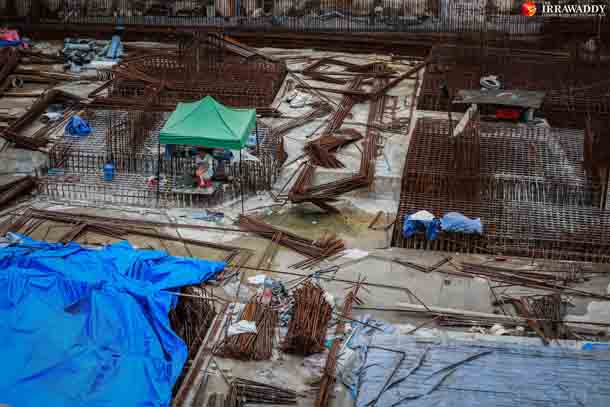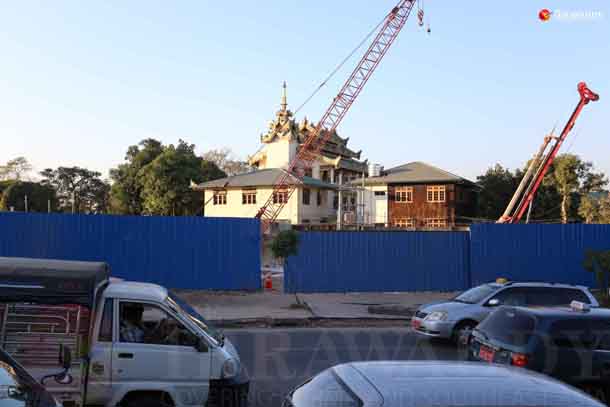RANGOON — The construction of a high-rise development in Rangoon owned by a former state parliamentarian and current leader of a government-aligned militia in Shan State was found to be proceeding in defiance of municipal government suspension orders.
Situated less than a hundred meters away from the residence of State Counselor Aung San Suu Kyi, the 12.5-story building project at 74 University Avenue was first ordered to halt construction in January by the Yangon City Development Committee (YCDC).
The reasons behind the halt order were: absence of the required approvals from the YCDC, failure to follow construction guidelines, and opposition from local residents who objected to any building flouting the neighborhood’s proposed 42-ft height cap.
“We have ordered them several times to halt but they simply paid out fines [and continued]. I saw that the project was still in progress as of Monday,” said YCDC secretary Hlaing Maw Oo on Thursday.
The project is owned by Kyaw Myint, chairman of the Pansay People’s Militia, an armed group allied with the Burma Army. The militia was founded some 20 years ago and is based in Muse, on the Sino-Burmese border in northern Shan State.

Kyaw Myint was previously a lawmaker in the Shan State parliament representing Namkham Township for the former ruling Union Solidarity and Development Party. Ethnic Palaung anti-drug activists have accused him of being a major player in the drug trade in northern Shan State, his Pansay militia controlling some 20,000 acres where poppy is grown.
The project was one of two in Rangoon whose suspension was proposed during a session of the previous Parliament in January. The proposal won a majority vote but was put on record in the Lower House, to be considered under the new Parliament that began in February.
Hlaing Maw Oo said initial approval for the high-rise project was revoked last month because the developers failed to follow YCDC orders, meaning it is now totally without official approval.
“They promised they would halt it by July 15 but the project was found to still be going on as of Monday,” the YCDC secretary said.
“If they keep on, we will revoke the licenses of their engineer and contractor,” she added.
On Thursday, The Irrawaddy found the project site deserted. A looming yellow tower crane sat idle inside a construction area sealed off with blue galvanized iron sheets. Deep excavation for a foundation was visible and construction had not surpassed the base level.
In early 2015, when the controversy over the building began, it had been charged with breaking YCDC regulations for conducting the ground excavation without permission.
“We have fined them more than 2.8 million kyats (US$2,360) because they breached articles 68 and 69 of the YCDC Act. They are still in breach now,” said Bahan Township Municipal Board Chairman Pe Than Aung during a press conference in January, on the subject of high rises in Rangoon, hosted by ex-YCDC member Khin Hlaing.

According to Article 68, anyone who violates the city’s construction regulations will be charged with up to one year in prison, a penalty of 10,000-500,000 kyats ($8-422), or both, while Article 69 holds that anyone that repeatedly violates Article 68 will be charged with up to one year in prison or a penalty of 10,000-50,000 ($8-42) per day till the offence is rectified.
“Two-point-eight million kyats is just like labor fees for them,” Khin Hliang commented at the press conference. He said the attitude of the developers was, “We can do as we like because we can afford the fines.”
In August last year, ten people living close to the project—including the abbots for four Buddhist monasteries—sent a petition to Khin Hlaing complaining about the prospect of a 12.5-story building in their neighborhood. The local residents said that when the developer asked them for their approvals in order to gain permission from the YCDC, the person representing the owner Kyaw Myint did not tell them it would be a high rise.
“He just said it would be a building for Kyaw Myint’s family. So, we said yes. If we had known that it was to be a high rise, we wouldn’t have signed ‘agreed,’” said U Zawana, the abbot of Lakefront Inya Monastery.
The abbot said that he would not accept any building above four stories in the neighborhood—a zoning guideline for the area proposed by the YCDC.
“Also, it could pose a threat to Daw Aung San Suu Kyi’s security because the building would be overlooking her residence,” he said.
Construction continued as normal after the first suspension order in January. U Ponnya Sara, the abbot of Weiluwun Monastery, which sits next to the construction site, said on Monday that the groundwork had been carried out over several months during the nighttime hours. The noise had disturbed the evening prayers and nighttime meditation of the 25 resident monks.
“They should be aware that there are monasteries nearby. It is very disrespectful,” the abbot said.
May Win Myint, the NLD lawmaker who proposed suspending the project in the Lower House, said she had been following the case from Naypyidaw and would investigate further after returning to Rangoon in a few days.
“If needed, I will submit the case to the Rangoon Divisional parliament for debate,” she said.
U Zawana, of the Lakefront Inya Monastery, wondered why the government appeared to be slow and lenient in its response to the illegal project.
“Is it because it is backed by a militia allied with the army?” he asked.
“It has to be in accordance with the law,” he said, adding that the attitude of the developers is,
“‘we have money, we can do as we like.”
The Irrawaddy tried to contact project owner Kyaw Myint on Thursday but he was not available for comment.

















